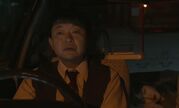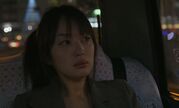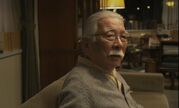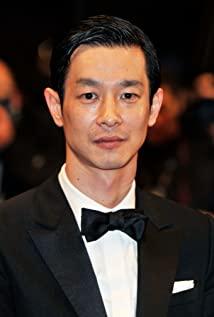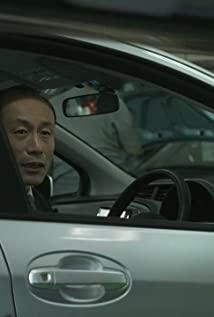It is said that Abbas observed around Tokyo and made up this story based on what he saw and felt. Remarkably, for a great observer, the sense of distance brings sharpness and precision. This is an essay on Tokyo handed over by Abbas.
The protagonist of this composition is none other than Tokyo. What is Tokyo? In a super city, business is so saturated that it is unbelievable, and people and things are so saturated that it is unbelievable. Such a super city can overwhelm people. Akiko was young and came from the countryside, and what would happen to her in a place where all kinds of things exploded? She had that look.
In the first scene at the bar, what impressed me the most was her expression. She looked stupid, just like a dirt. Those eyes seemed to be watching the reaction of the other party timidly at any time. Although the mouth repeatedly repeated the reasons for not cooperating, it was just a mechanical and dull conditioned reflex. Even screaming at the end was just a scream. any willpower. After screaming, he followed them away.
Then on the road, in a taxi. There was a lot of camera footage of the driver's face in the taxi. It's a cutscene, but the main character is Tokyo, so it's also a face of Tokyo. The urban emptiness on this character's face is fully revealed, as if there is no gender, let alone joys and sorrows. As a driver in such a city, what can you control by yourself? Vitality was completely drained. No need to explain his ins and outs, everyone understands.
The old man appeared.
The old man is a very good and well-established person. He is a writer, a sociologist, and a translator. He used to have a family, a wife and a daughter, and now he lives alone. The figure walking slowly around the house looks lonely, but he is so lonely. This kind of loneliness is not complete: what amazes me the most is that his room is so loud, right next to the road, the sound of traffic and motorcycle racing is constant 24 hours a day, and in the daytime, in addition to the traffic noise, there is also the sound of children playing, and There's the constant ringing of the phone, the rude intrusions into his time at any time, the job that he can't help saying he can't refuse. The protagonist of "Tokyo" is constantly invading, so his loneliness is also the loneliness of modern urbanites.
The details of Akiko's dislike of hometown soup reveal her reason for coming to Tokyo: Young people always hate hometown. She only knew that she hated her hometown, and she was so disgusted that she would not turn back even if she still had feelings in her heart (she was still in tears when she saw her grandmother waiting patiently at the station), but she didn't know what to look for in Tokyo. It looks like there is everything here, but it also seems to be empty. Therefore, "urban life" has been taken away from all the basis and origin, and it has become our only choice. There is no need to answer why. Is there any possibility other than this? We were cut off from the way we came, and the village belonged to the elderly and could not go back.
Why study sociology? Why are you dating this man? Why be a call girl? What's next? She doesn't know at all.
She is always shy, which is also a common symptom of people trapped in urban life, isn't it? We never get enough sleep, never sleep well. It comes from being stripped of all initiative and spontaneity, like the driver's genderless and expressive face.
The old man's major is actually quite meaningful. A scholar whose room is almost occupied by bookshelves and who is almost overwhelmed by a mountain of books, an "expert" who has done research on society for a lifetime, has been dismissed by a "brick house" one brick at a time. down. When we see him working, he is translating, implying that sociology is a foreign and foreign thing, what can it do for Tokyo? The "brick house" is very powerful. He pointed out that they are just some outdated foreign books, and they can't solve the immediate problem at all.
Isn't the "brick house" itself outdated? He was another country man (which might explain why Akiko was with him, he made her feel familiar), though young, he held to the traditional values instilled by his grandfather, insisting on the custom of seeing his parents before marriage, naively thinking that Getting married and making himself a husband can solve everything. He is actually sincere, polite and down-to-earth in his work. He is really a good boy, but he just can't cope with this life. When the simple illusion is broken, he has to take out a brick to vent. On a certain person, because he didn't know who caused all this, he "pulled his sword and looked around at a loss".
I think the key to this movie is the old man's setting. His home is a "study", but this city can't actually accommodate a quiet study. His sociology is exposed in society like a dangerous egg. His whole intention never came true, he called Qiuzi to come, bought wine, made soup from Qiuzi's hometown, prepared candles, maybe he wanted to get some human comfort from Qiuzi who looked like his wife and daughter, but This wish and arrangement is constantly interrupted by all kinds of trivialities and accidents, either by a sudden job, or by Qiuzi's troubles, and the increasingly looming threat of Qiuzi's boyfriend after he appears. From the old man, we can see that people can't communicate with each other, others can't meet your expectations, and constantly cope with small accidents until they are knocked down by big accidents.
As if living naked in a crowd, everyone is rational when viewed alone, but crazy together, like crowding together in a small boat, either sinking or out of control. Because we've surrendered our individual sanity to something bigger, something like a matrix, that made a monster as big as Tokyo.
Like a river of love? Don't be kidding, there's everything here except this one.
View more about Like Someone in Love reviews



